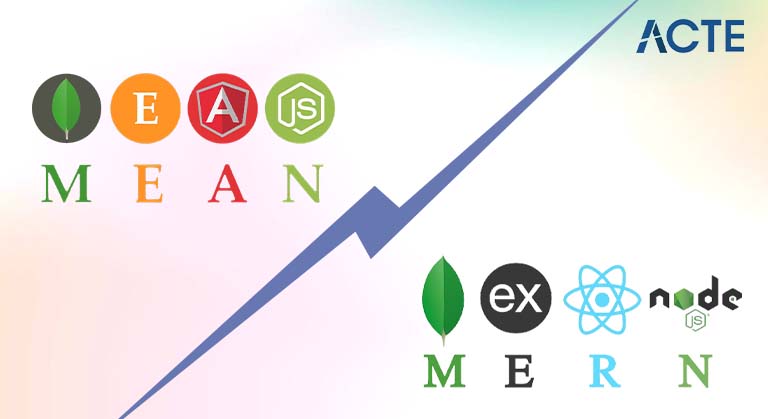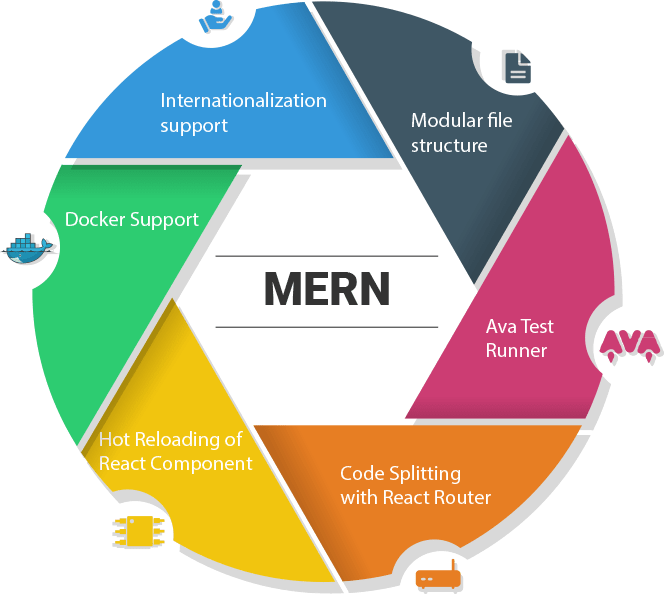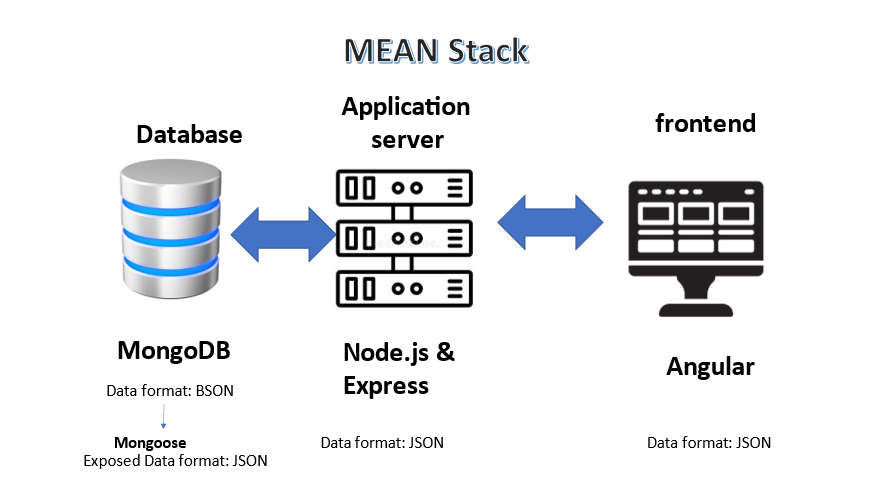
- Introduction to Web Development Stacks
- What is MEAN Stack?
- What is MERN Stack?
- Technologies Used in MEAN
- Technologies Used in MERN
- Key Differences: Angular vs React
- Performance Comparison
- Community Support and Ecosystem
- Learning Curve & Developer Experience
- Use Cases for Each Stack
- Job Market and Career Opportunities
- Which Stack Should You Choose?
- Conclusion
Introduction to Web Development Stacks
Web development stacks have become crucial for developing dynamic, scalable, high-performance web applications. A stack is a group of technologies collaborating to create front-end and back-end applications. The choice of a stack greatly influences the application’s architecture, performance, maintainability, and scalability. Two of the most widely used web development stacks currently are the MEAN and MERN stacks. These full-stack JavaScript frameworks allow developers to work with a single language throughout development. The MEAN and MERN stacks are constructed on JavaScript technologies, which makes them perfect for quick development. The only fundamental difference between the two is the front-end framework: Angular in MEAN and React in MERN. This selection affects the overall development experience and performance. For those looking to build expertise in this field, exploring Web Designing & Development Courses can be a great starting point. This report will extensively examine both stacks, comparing their elements, features, use cases, and market applicability.
What is MERN Stack
MEAN is an acronym for MongoDB, Express.js, Angular, and Node.js. It is a full-stack web development framework widely used to develop dynamic web applications using JavaScript across development. MongoDB is a NoSQL database storing data in dynamic, JSON-like documents. Express.js is a Node.js back-end web app framework for building APIs and web applications. How to Become a Web Developer is a valuable resource for those aiming to master these technologies and pursue a career in full-stack development. Angular is a TypeScript front-end framework by Google that allows one to develop dynamic single-page applications. Node.js is a JavaScript runtime where server-side code runs, making it possible to build scalable apps. MEAN stack is used extensively due to its flexibility, scalability, and support for real-time data handling. It offers various JavaScript-based development environments, which make applications more convenient to build and sustain.

Technologies Used in MEAN
The MEAN stack consists of four core technologies, each playing a vital role in building full-stack web applications:
- MongoDB: A NoSQL, document-oriented database that stores data in JSON-like documents, supporting a flexible, dynamic schema.
- Express.js: A lightweight server framework for Node.js, responsible for managing HTTP requests and routing, simplifying backend development.
- Angular: A robust MVC framework that supports two-way data binding and dependency injection, providing comprehensive tools for front-end development.
- Node.js: A server-side JavaScript runtime with an event-driven, non-blocking I/O model, ideal for scalable network applications.
- Angular: A complete MVC framework with a steeper learning curve, often requiring TypeScript, and uses two-way data binding.
- React: A JavaScript library focused on the View layer, easier to learn, especially for developers with JavaScript experience, and uses one-way data binding.
- Performance: React outperforms Angular due to its virtual DOM, while Angular’s real DOM can slow down updates in large applications.
- Community & Libraries: React has a larger community and a wealth of third-party libraries, while Angular offers a more opinionated structure with built-in solutions.
- Enterprise-level applications
- E-commerce platforms
- Real-time applications with a structured codebase
- Applications requiring advanced form validations and dynamic routing MERN Stack:
- Social media platforms
- Single-page applications (SPAs)
- Content management systems (CMS)
- Real-time data-intensive dashboards
These technologies work together to offer a seamless development experience for both front-end and back-end, using JavaScript and TypeScript.
Technologies Used in MERN
The MERN stack also uses four key technologies, with the significant difference being in the front-end framework:
MongoDB is a NoSQL database with a schema-less structure, making it ideal for JSON-based applications where data is dynamic and unstructured. Its flexibility allows developers to adapt to evolving data without the constraints of rigid schemas. Express.js, a minimalist web framework for Node.js, provides tools and middleware to streamline the development of web applications, particularly RESTful APIs, simplifying routing and request handling. React, a JavaScript library for building user interfaces, uses a virtual DOM to optimize performance by reducing the need for costly DOM manipulations, ensuring a smooth, responsive user experience. What is an HTML Iframe is a useful concept often encountered when embedding external content or enhancing interactivity in modern web applications. Its component-based architecture allows for reusable code, while one-way data binding ensures predictable data flow, making it highly maintainable. Node.js, built on Chrome’s V8 engine, leverages a non-blocking I/O model, allowing for efficient handling of concurrent client requests and making it highly scalable and fast, especially for real-time applications. Together, these technologies form the MERN stack, a powerful combination that’s well-suited for building modern, scalable applications that require rich user interfaces, high interactivity, and performance optimization. This stack is particularly favored for applications that need to handle dynamic, data-intensive workloads while providing an engaging and seamless user experience.
Excited to Obtaining Your web developer Certificate? View The web developer course Offered By ACTE Right Now!
Key Differences: Angular vs React
The key distinction between the MEAN and MERN stacks lies in the front-end framework used: Angular in MEAN and React in MERN. Here are the primary differences:
These differences impact how developers approach and build applications using either stack.
Interested in Pursuing Web Developer Master’s Program? Enroll For Web developer course Today!
Performance Comparison
Both MEAN and MERN stacks offer excellent performance, but the choice of Angular or React can influence the final application speed. React (MERN) benefits from a virtual DOM that increases rendering performance. Component reusability and lazy loading further enhance application speed and responsiveness. Web Developer Certification programs can equip developers with the skills needed to optimize these performance advantages effectively. Angular (MEAN) offers Ahead-of-Time (AOT) compilation, which speeds up rendering. Built-in optimizations in Angular help manage large-scale applications effectively. The performance also depends on how the code is written and how efficiently the back end communicates with the front end. React-based applications usually have a slight edge in terms of speed and responsiveness.

Community Support and Ecosystem
React (MERN) boasts a vast and active community, supported by a rich ecosystem of third-party tools and libraries. As a highly flexible JavaScript library, it is backed by Meta (formerly Facebook), which contributes significantly to its development and growth. React’s ecosystem allows developers to mix and match various tools and libraries to suit their specific project needs, offering immense versatility and freedom. Its component-based architecture enables developers to build reusable UI components, and its virtual DOM ensures optimal performance, especially in dynamic, data-driven applications.
Angular (MEAN), backed by Google, is a robust and opinionated framework designed for building dynamic single-page applications. It provides a more structured approach with an integrated set of tools, official libraries, and comprehensive documentation, making it easier for developers to get started and maintain consistency throughout their projects. While Angular may not have the same level of third-party contributions as React, React Bootstrap is an example of a widely-used third-party library in the React ecosystem that simplifies styling and layout using Bootstrap components. It offers a wide range of built-in features and a strong out-of-the-box solution for common development needs. The framework’s more rigid structure can be advantageous for teams working on large-scale applications, ensuring a more organized and cohesive ecosystem.
In summary, MERN offers greater flexibility and freedom with fewer constraints, making it a popular choice for developers who value customization. In contrast, MEAN provides a more structured and opinionated approach, which may appeal to teams looking for consistency and predefined solutions across their projects. Both stacks have their strengths, with React providing a more adaptable solution and Angular offering a more comprehensive, out-of-the-box framework.
Learning Curve & Developer Experience
The MERN stack is ideal for beginners with basic JavaScript knowledge, offering simplicity through React’s reusable components, which accelerates learning and simplifies prototyping. For Loop in React is one of the foundational concepts new developers often encounter when building dynamic lists and rendering components efficiently. Its modular approach allows developers to break down complex applications into smaller parts, making it more approachable and faster to develop. In contrast, the MEAN stack is more comprehensive and structured, with Angular providing a complete framework that includes a robust set of tools. However, Angular’s steep learning curve, requiring an understanding of TypeScript, directives, and dependency injection, can be a barrier for beginners. While both stacks offer excellent developer tools, MERN’s flexibility, lower barrier to entry, and focus on UI components make it more appealing to new developers, whereas MEAN’s structure and convention-heavy nature are better suited for larger projects or teams looking for a more organized framework.
Use Cases for Each Stack
The MEAN and MERN stacks have distinct use cases based on the types of applications they are best suited for. Here are the key use cases for each:
MEAN Stack:In general, MERN is favored for applications with high user interaction, while MEAN is more suited for complex enterprise applications.
Job Market and Career Opportunities
Both MEAN and MERN stacks have strong job markets. However, due to React’s widespread adoption, React developers (MERN) are currently in higher demand. MEAN Stack careers include roles such as Angular Developer, Full-stack JavaScript Developer, and Back-end Developer (Node.js + Express). MERN Stack careers include React Developer, Front-end Engineer, and Full-stack Developer. What is an HTML Iframe is a common topic front-end developers may encounter, especially when working with embedded content or integrating third-party services. Large companies, startups, and product-based firms seek developers skilled in either stack. Learning either stack opens the door to freelance opportunities, full-time roles, and remote jobs.
Which Stack Should You Choose
Choosing between MEAN and MERN depends on your project requirements, team expertise, and long-term goals. Choose MEAN if you prefer a complete, opinionated framework, your team is comfortable with TypeScript and Angular, or you’re building complex, large-scale applications. Choose MERN if you want a flexible and modular approach, yobuildighly interactive UIs, or Yoefer React’s ecosystem and ease of learning. Ultimately, both stacks are capable and popular choices in web development. Selecting one should align with your development needs, target audience, and future scalability plans.
Conclusion
Both the MEAN and MERN stacks offer robust full-stack JavaScript solutions for developing modern web applications, each catering to different project needs. The MEAN stack, which uses Angular, is well-suited for structured, enterprise-level applications due to its comprehensive framework and built-in tools. On the other hand, the MERN stack, featuring React, excels in building highly interactive user interfaces with greater flexibility, a component-based architecture, and a more approachable learning curve. Web Designing Training can help bridge the knowledge gap and provide foundational skills crucial for mastering either stack. React’s virtual DOM enhances performance, while Angular’s opinionated structure benefits complex, large-scale applications. The choice between MEAN and MERN should depend on factors such as project requirements, team expertise, and long-term scalability goals. With strong demand in the job market for both stacks, learning either can significantly enhance a developer’s career prospects in the field of web development.

